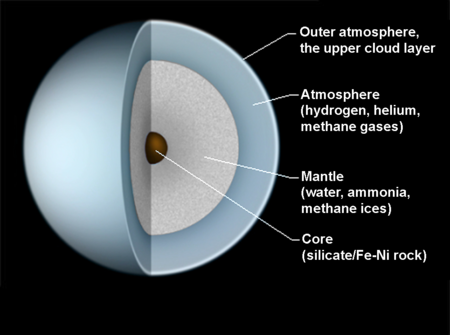Welcome to Learn to Astronomy! In this article, we will explore the fascinating world of Uranus, a planet that holds many secrets within its unique name. Discover why Uranus stands out among the other planets in our solar system and uncover the captivating stories behind its intriguing title. Join us on this cosmic journey to unlock the wonders of Uranus.
Let’s dive into the mysteries of Uranus and unravel the enigma behind its extraordinary name!
What is Uranus called in the realm of Astronomy? Exploring the celestial identity of the seventh planet in our solar system.
Uranus, the seventh planet in our solar system, is referred to as the “Ice Giant” in the realm of Astronomy. It earned this name due to its composition, which primarily consists of hydrogen and helium, along with traces of water and methane. The presence of these compounds gives Uranus a bluish-green appearance, making it distinct from other planets in our solar system. Its unique tilt also sets it apart, as Uranus rotates on its side, causing its poles to be oriented almost perpendicular to its orbit. This characteristic results in extreme seasons, with each pole experiencing 42 years of continuous daylight followed by 42 years of darkness. These intriguing features make Uranus a captivating subject of study for astronomers. The planet was discovered in 1781 by Sir William Herschel and was initially named “Georgian Sidus” after King George III. However, it was later renamed Uranus to align with the tradition of naming planets after Roman deities. As we continue to explore and learn more about Uranus, it provides us with valuable insights into the formation and evolution of our solar system.
What If Jupiter Swallowed Earth?
[arve url=”https://www.youtube.com/embed/whIJRZB_dfc”/]
What If Jupiter and Uranus Collided?
[arve url=”https://www.youtube.com/embed/NiS6_K-GHxs”/]
Frequent questions
What is the proper name for the planet Uranus in the field of Astronomy?
The proper name for the planet Uranus in the field of Astronomy is Uranus. It was named after the Greek god of the sky.
How did Uranus get its unique and peculiar name in the realm of Astronomy?
Uranus received its unique and peculiar name in the realm of Astronomy due to its association with Greek mythology. In the 18th century, the discovery of Uranus marked the first time a planet was found using a telescope.
British astronomer William Herschel discovered Uranus on March 13, 1781, but initially, he thought it was a comet. As more observations were made, it became clear that Uranus was a new planet in our solar system.
Herschel suggested naming the planet “Georgium Sidus” or “George’s Star” after King George III of England, as a way to honor his patronage and support for Herschel’s astronomical work. However, this name was not widely accepted outside of Britain.
Instead, the planet was eventually named “Uranus” in 1783 by German astronomer Johann Elert Bode. Bode proposed this name to maintain consistency with the tradition of naming planets after mythological figures from ancient Greece and Rome. Uranus was chosen as the name to reflect the deep connection between astronomy and mythology.
In Greek mythology, Uranus was the primordial god of the sky and father of Saturn (Cronus). The name Uranus is derived from the Greek word “Ouranos,” which means “heaven” or “sky.”
Therefore, Uranus obtained its unique and distinctive name based on its connection to mythology, as was the tradition for naming celestial bodies in the field of Astronomy.
In the context of Astronomy, why is Uranus referred to by a different name than the Greek god it is named after?
In the context of Astronomy, **Uranus** is referred to by a different name than the Greek god it is named after because of the potential confusion it may cause. The planet Uranus was originally named after the Greek god of the sky, Uranus, by its discoverer Sir William Herschel in 1781. However, over time, the scientific community realized that using the name Uranus could lead to unintended comedic interpretations due to its similarity to the word “urine.” To avoid this, and to maintain a more serious and respectful image, the decision was made to refer to the planet simply as “Uranus” rather than “Ouranos” (the correct transliteration of the Greek god’s name). This helps to avoid any unnecessary humor or confusion in scientific discussions about the planet.
In conclusion, Uranus has a unique and intriguing name in the context of Astronomy. Named after the ancient Greek god of the sky, Uranus stands out among the other planets in our solar system with its distinct blue hue and sideways rotation. Its discovery in 1781 marked a significant milestone in the understanding of our celestial neighborhood. Furthermore, the study of Uranus has provided valuable insights into the formation and evolution of gas giant planets. As we continue to explore and unravel the mysteries of the universe, Uranus serves as a constant reminder of the wonders that await us beyond Earth’s boundaries.

